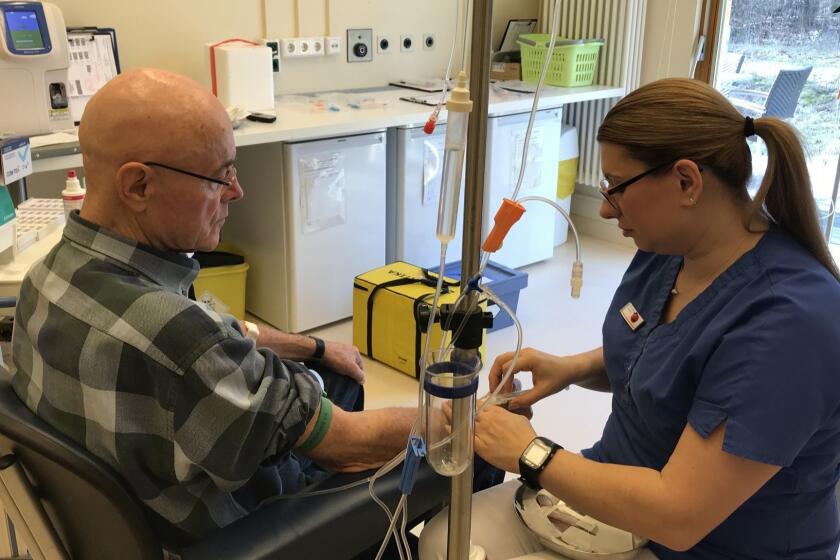Trump makes new pledge to restrain drug prices, but consumers aren’t likely to see relief soon
- Share via
WASHINGTON — Laboring to address one of his largest unfulfilled campaign promises from 2016, President Trump made a new pledge Friday to rein in prescription drug prices with a series of four executive orders he signed at the White House.
The president, whose administration has struggled for 3½ years to follow through on initiatives to control pharmaceutical costs, touted the moves as “bold and historic.”
But the executive orders are unlikely to deliver relief to consumers any time soon. They require new regulations that typically take months to finalize. Some may never be implemented at all.
And Trump’s announcement was dismissed by several patient advocates as more rhetoric than substance.
“While some of these proposals could help a limited number of people access insulin or EpiPens, they are pathetically small compared to the massive executive power Trump could use to make medicine affordable and available for all, if he were willing to stand up to Big Pharma,” said Peter Maybarduk, director of Public Citizen’s Access to Medicines program.
Although Trump has repeatedly pledged to take on drug prices, he hasn’t followed through and has paid a political price. Seven in 10 Americans don’t believe he is doing enough to lower medication prices, according to a November poll by the nonprofit Kaiser Family Foundation.
One of the new executive orders directs the federal government to require federally funded health clinics to give patients any discounts the clinics get for insulin and EpiPens, two drugs that have seen steep price increases in recent years.
Another order calls for the Health and Human Services Department to write new rules allowing importation of lower-cost drugs from Canada and other countries. The administration announced that proposal nearly a year ago, but hasn’t finalized it.
A third order revives another long-standing administration proposal that was never implemented to limit rebates secured by pharmacy benefit managers who negotiate prices with drugmakers on behalf of health insurers.
And the final order, which was originally proposed two years ago by Trump administration officials but never implemented, would direct Medicare to develop a program to secure some drugs at the same prices that other nations are able to negotiate, according to administration officials.
The president said that order won’t take effect for another month, a delay he said would allow drugmakers to offer their own cost containment plan. It would apply only to drugs administered by physicians though Medicare Part B, not drugs patients buy through the Part D drug plan.
“We are now doing something that is going to be incredible for the America,” Trump said Friday afternoon.
But the president’s White House event, which comes about 100 days before election day, also highlighted how little progress the administration has made on what was once a signature issue for Trump.
Trump himself noted Friday: “We’re doing something that should have been done a long time ago.”
Drug prices continue to surge upwards, with some of the biggest increases coming in medications that are critical to treating patients infected by the coronavirus, a recent report by the advocacy group Patients for Affordable Drugs showed.
Trump has repeatedly promised relief to patients by, among other things, allowing Medicare to start negotiating directly with drug companies. Because Medicare plays such a huge role in the healthcare market, it has very large potential leverage to negotiate lower drug prices, but federal law does not allow that to happen.
Drug companies and Republican leaders on Capitol Hill oppose giving Medicare negotiating authority because they say it would be akin to government price controls. After initially supporting the idea, Trump later reversed his position on Medicare negotiation, rejecting a proposal by House Democrats to give the federal program negotiating authority.
Medicare drug negotiation, which enjoys broad bipartisan support among voters, is a centerpiece of former Vice President Joe Biden’s healthcare plan.
House Democrats in December passed sweeping legislation to tackle high prices and give Medicare the authority to negotiate for lower prices on up to 250 medications.
The bill was rejected by the White House and Republican leaders in the Senate, and it appears increasingly unlikely lawmakers will be able to reach a compromise on any major prescription drug legislation this year.
Over the last several years, several other Trump administration initiatives to rein in prices have stalled or been abandoned, including proposals to restrict rebates that insurers and drug companies often negotiate and to require drugmakers to list prices in television ads.
Other wealthy countries in Europe, East Asia and elsewhere more aggressively control the cost of medications, either directly through government price-setting or indirectly through tightly regulated price negotiations.
That has protected patients in these countries from the cost burdens that now routinely overwhelm Americans.
For example, just 7% of Germans reported cost-related problems getting medical care in the last year, compared with a third of Americans, an international survey recently found.
Patients who come to the Havelhöhe cancer clinic in the leafy outskirts of Germany’s capital are often very sick.
With little to no price regulation in the U.S., insurers and pharmacy benefit companies negotiate their own prices with drugmakers, all of which are generally secret, and then pass on costs to patients.
More to Read
Get the L.A. Times Politics newsletter
Deeply reported insights into legislation, politics and policy from Sacramento, Washington and beyond. In your inbox twice per week.
You may occasionally receive promotional content from the Los Angeles Times.












